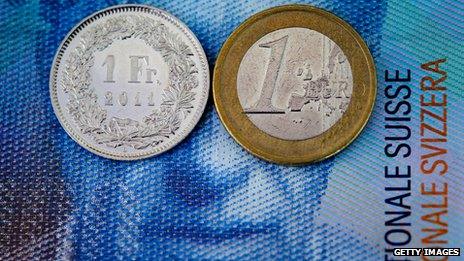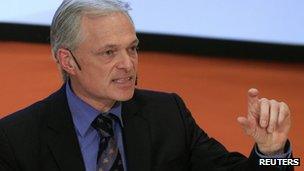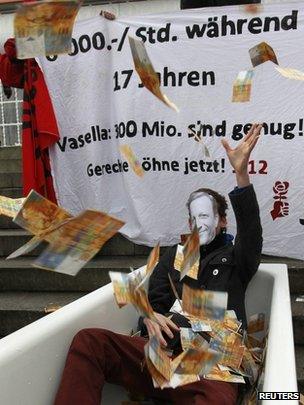Will Swiss 'fat cats' be put on diets?
- Published

Switzerland might introduce executive pay laws that are stricter than the limit on bonuses just approved by the European Union
Switzerland's voters go to the polls to decide on controversial proposals which would impose strict limits on the salaries awarded to top executives.
The proposals are the brain child of Swiss businessman turned politician Thomas Minder, who runs a small family company producing natural cosmetics.
Mr Minder wants shareholders to have a veto over managers' salaries, and to ban golden handshakes altogether.
The "fat cat initiative", as it has come to be called, would, if approved, be written into the Swiss constitution, and would apply to all Swiss companies listed on Switzerland's stock exchange.
Mr Minder, an outspoken man, says the culture of high salaries and high bonuses in Switzerland has got out of hand, pointing to the fact that huge sums have been paid out even when the companies concerned were doing badly.
The bankruptcy of national icon Swissair back in 2001, and the subsequent huge payoffs to its failed boss Mario Corti, were the catalyst to Mr Minder's decision to act.
"That really stuck in my throat," he told Swiss television. "It made me absolutely furious.
"I'm still furious today, to think that a chief executive like Mr Corti could get five years' salary to go. I mean, the company was in a disastrous situation. At the end he wasn't even paying its bills. Swissair went bankrupt. The company doesn't exist anymore."
High rewards for low performance?
Salaries for Swiss top managers are higher than most and their taxes are lower.

Thomas Minder is angry at the way many executives have been rewarded for failure
These two things alone would not necessarily anger most voters, however.
What has attracted support for Mr Minder's initiative has been a series of perceived disasters for major Swiss companies, coupled with salaries and bonuses staying high.
The main example is banking giant UBS, which wrote off billions in the wake of the 2007 sub-prime mortgage crisis, and then had to be bailed out by the Swiss government.
After that, the bank lost more billions because of a rogue trader, and announced thousands of redundancies.
But high salaries and bonuses for the bank's top managers continued throughout.
"The fat cats are getting fattest in the banks," says Edouard Dommen of the Swiss shareholders group Actares.
"The other companies are getting fat, but not quite so grossly."
Mr Dommen, who supports the new measures, believes voters are especially angry about UBS, because their own tax money had to be spent to bail out the bank.
"People are fed up," he says. "They know that this is at their expense.
"Small people had to dig into their own pockets to bail out these banks, and then see people, some of whom turned out to be literally crooks, walk off with their money, so of course they are angry."
Bad for competition
If passed, the measures would give Switzerland some of the strictest laws on executive pay in the world, far tougher than the limit on bonuses just approved by the European Union.
Both the Swiss government and Swiss business leaders have been campaigning against the measures.
The government says it understands that voters want some control over high salaries and has offered a milder alternative, but so far this seems to have attracted little interest.
Meanwhile the Swiss Business Association has been arguing that the measures would undermine Switzerland's ability to compete.
"Certainly, it will damage our competitiveness," says the association's deputy head of competition and regulation, Meinrad Vetter. "We are against this initiative because it violates Switzerland as a business location.
"It's not good if the corporation law is too strict and too rigid in comparison to other countries, and with this initiative we will be an island in corporate governance all over the world."
Business leaders have argued that some of Switzerland's biggest companies might simply leave, if they were unable to attract top quality managers because they were not allowed to pay them what they wanted.
Novartis outrage
For the pharmaceutical giant Novartis, such a move might actually be quite easy.

Golden parachutes for Swiss executives have sparked much anger
The company's current headquarters is in Basel, within sight of both the German and French borders.
Concerns over loss of competitiveness, and fears that Swiss companies might emigrate, did at first seem to be striking a chord with voters.
But one event, caused ironically by Novartis itself, seems to have changed a lot of minds.
In February of this year it was announced that Novartis' outgoing chairman Daniel Vasella would be receiving a 72m Swiss francs (£51m; $78m) "non-compete" pay off over six years, designed to stop him working for other related industries.
There was amazement and anger in Switzerland. Mr Vasella's salary had been regarded by many as excessively high for some time. Meanwhile, Novartis had been cutting jobs.
"I thought this was absolutely astonishing," says Mr Dommen, a man who doesn't mince his words.
"He is an idiot. I say he's an idiot because given this vote is coming up, to do something so grossly provocative at that moment just guaranteed that the opposition was going to win."
The payment was scrapped in response to protests.
And indeed, the latest opinion polls seem to reflect that, showing that 64% of voters will say yes to the "fat cat initiative".
Mr Dommen does not believe a yes vote will isolate Switzerland.
Instead, he says, it would bring his country into line with public opinion across Europe.
"Times are changing throughout Europe," he says.
"The period when people could get away with these enormous salaries is going out of fashion.
"In Switzerland we are not on a different planet - it's going out of fashion here too. Most Swiss voters think something has to change."
Opinion polls have been wrong in the past, of course, but all the signs are that on Sunday, Switzerland's fat cats will have to start tightening their belts.